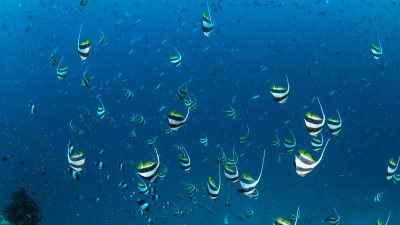
Fish do absorb water through their skin and gills in a process called osmosis. Osmosis is the flow of water across membranes from areas of low concentration of dissolved things (solutes) to areas of high concentration. It serves to equalize the concentrations in the two areas.
In the case of freshwater fish, their blood and bodily fluids are much saltier than the water they swim in, so water will flow in through their gills. The opposite is true for saltwater fish.
As well as getting water through osmosis, saltwater fish need to purposefully drink water in order to get enough into their systems. Where their freshwater counterparts direct all of the water that comes into their mouths out through their gills, saltwater fish direct some into their digestive tract.
But fishes’ bodies, just like ours, need a certain concentration of salt to function best. They can’t just allow the water to diffuse freely through their gills; the saltwater fish would shrivel up and the freshwater fish would explode!
To stop the exploding fish phenomenon, their gills have special cells that selectively pump salt in, or out of their blood. In freshwater fish, the cells constantly pump salt in, and in saltwater fish, they constantly pump salt out. Saltwater fishes’ kidneys also help to filter out some of their salt.
Credit : McGill
Picture Credit : Google




